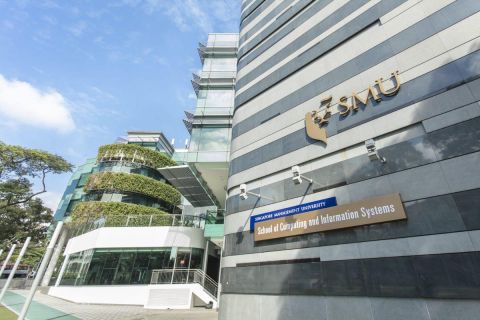
SMU’s Centre for AI and Data Governance launches new research, policy and community outreach initiative to improve human-AI exchanges
Singapore, 16 June 2021 (Wednesday) – Singapore Management University (SMU)’s Centre for AI and Data Governance (CAIDG), has launched a research initiative “AI in Community” to locate AI and Big Data within communities, as part of effort to make Singapore a global leader in the race for Human-Centred AI. The outcomes would transform the relationship between AI designers and the community, such that AI technology would not only be customised for AI clients, but designed for the community in mind.
Modelled after the Stanford HAI (Human-centred artificial intelligence), this new research, policy and community outreach initiative builds on CAIDG’s rich experience in target topics of public interest, namely Trustworthy AI, Grassroots Ethics, Responsible COVID Surveillance Technology, Fair Platform Economies, Safe Automated Vehicles, Open Finance, Care Robotics, Citizen-centric Smart Cities, and People-focused Personal Data.
The research will identify AI as a trusted tool to nurture positive community perspectives and to improve the public’s understanding of it. By exploring the way that AI and data can be a part of the community, CAIDG aims to debunk the public’s perception that benefits and risks associated with AI and mass data sharing are beyond their control. AI would no longer be seen as a problem, but as a solution to current and future sustainability matters.
Current issues
Many aspects in society, for example public transport, health service delivery, schooling, banking, on-line purchases, public utilities, and food delivery apps rely on AI-assisted technology and produce big data. CAIDG’s research will address the community’s central concern about AI – how can people relate to new technology so that life is better, safer and more sustainable?
Professor Mark Findlay, Director, CAIDG cites some examples, “If people do not trust AI (as with TraceTogether in the early stages) they are less likely to cooperate. However, if the AI is explained in ways people understand, with the risks and benefits made clear, with community attitudes influencing the design of AI apps, then trust can be generated. Trust is a difficult thing to measure. Why are people happy to get onto the Downtown MRT train without a driver but fear an autonomous taxi? The answer may lie in what people see as beneficial and understandable.”
He said, “AI In Community is designed as a people-first research commitment in CAIDG to ensure the expansion of AI and mass data use in Singapore and beyond, and progresses with much more than profit in mind. Communities should be involved in the important stages of AI creation and deployment to ensure that technology sits comfortably within the societies in which we prefer to live.”
Solutions the initiative will provide
AI in Community allows people to see where AI is, what it does, why it is doing what it does, and have a say in the data it produces. For example, recent MRT outages have caused much inconvenience to commuters. In part this is because the AI that assisted in train maintenance and the warnings it was revealing were not openly known and understood by commuters. Another example would be job applications processed by AI that are rejected without explanation, on information that was incorrect. AI in Community would reveal these problems and allow timely corrections. If you want to move from one bank to another, AI in Community can ensure that your personal data travels with you. You might be happy to have a robot assist your surgeon in performing a delicate operation, but how many of you would go to a robot dentist? AI in Community will offer opportunities to discuss and determine when AI is appropriate and when it is not. How often have you been frustrated by chatbots that never seem to listen or have the right answers? AI in Community can help develop chatbots that service customer need and not just streamline enquiry administration.
Professor Findlay said “This new initiative is especially significant for post-COVID recovery. For years now we have heard discussions about principled design, ethical AI, responsible data management and more recently, trusted technology. Much of this work could be said to have missed the mark when it comes to dealing with what people think is important.
Our work on building trust and ensuring AI-to-humans accountability has clearly shown that public confidence in AI depends on answering social concerns and explaining risks. CAIDG has taken on the challenge to listen to these fears and work towards solutions.”
The AI in Community initiative will focus on 5 key areas:
1. Kampong Ethics – Locating AI in communities (social, industrial, commercial) so that humans and machines are linked by relationships of trust where technology essentially contributes to public good.
2. Smart Cities and AI/Big Data – Singapore’s Smart Nation policy has a citizen-centric core. Consistent with this commitment is the need to position AI and Big data alongside the community to improve the quality of life.
3. Digital Self-determination – In a world drowning in data it is time to ensure that data subjects have management of their data in safe data spaces
4. Open Finance – The days of paper money are almost over. Along with digital finance in every aspect of commercial activity, it is critical that open finance brings the ecosystem closer to true customer-centricity.
5. Positive Surveillance – COVID-19 has introduced us all into a new normal where our movement, association and daily habits are monitored. How can we be confident that surveillance and privacy are not in conflict?
Originally published at https://news.smu.edu.sg/news/2021/06/17/smus-centre-ai-and-data-governance-launches-new-research-policy-and-community
Back to Research@SMU Aug 2021 Issue
Want to see more of SMU Research?
Sign up for Research@SMU e-newslettter to know more about our research and research-related events!
If you would like to remove yourself from all our mailing list, please visit https://eservices.smu.edu.sg/internet/DNC/Default.aspx

